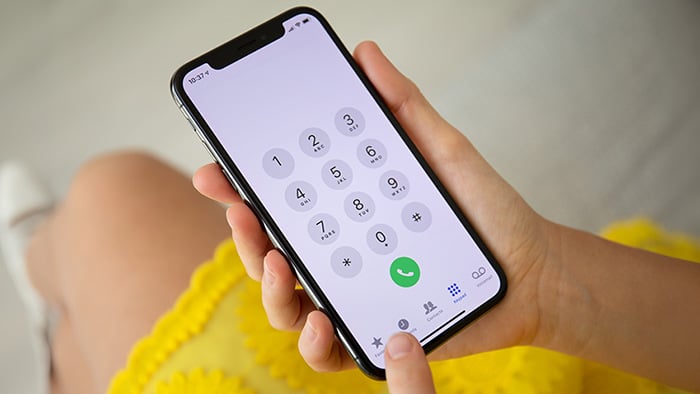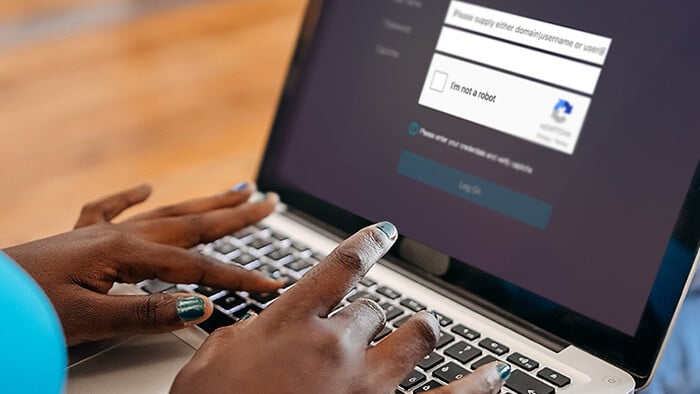What can someone do with your phone number?
While a scammer will generally need more information to steal your identity or hack into your accounts, it’s a slippery slope. A phone number is sensitive personally identifiable information (PII). With just your number, a cybercriminal could try and scam you or your loved ones, sell it on the dark web, or dupe you into disclosing more info. Then, combined with other data like your name, email, and birthday, they could attempt to hack your personal accounts or commit identity theft.
Here’s how a scammer might use your phone number.
Take over your phone with a SIM swap scam
Your phone number can be transferred between carriers using a process called number porting, which lets you keep your number when switching to a new provider. SIM swapping (also known as SIM jacking) occurs when scammers exploit this tool to hijack your phone number.
How this scam works:
-
A scammer contacts your mobile carrier, pretending to be you. They claim they’ve lost their phone or SIM card and request a number transfer.
-
Your carrier transfers your number to a new SIM card controlled by the scammer.
-
The scammer can now send and receive messages, make calls, and receive two-factor authentication codes to take over your accounts.

Help protect yourself:
Lock your SIM with a PIN. Even if someone tries to swap your SIM, they won’t get far without the PIN. Avoid simple pins like 1234 or your birthdate.
Reroute your number
Someone can “steal” your phone number and use it as if it belongs to them. Mobile carriers have built-in security measures, but skilled scammers can use social engineering to trick providers into rerouting your number or setting up call/SMS forwarding. This can give them access to your calls, messages, and online accounts.
How malicious rerouting happens:
-
A hacker contacts your mobile provider, pretending to be you. Armed with your stolen personal details, they can pass security checks and make changes to your account.
-
They request that all calls and messages be forwarded to a number they control. Once approved, they can intercept your calls and messages.
-
With access to your texts, they can exploit the “Forgot Password” feature on various accounts and use the verification codes to reset your passwords.

Help protect yourself:
Where possible, use authenticator apps or hardware security keys instead of SMS-based
two-factor authentication.
Steal your personal information
With your phone number and enough of your info, scammers can use your details to sign up for accounts, like credit cards. Today’s cybercriminals wield a phone number like a spade, digging up:
-
Email accounts and contact lists so they can sign up for things in your name or target you and your contacts with social engineering attacks.
-
Banking and financial details, potentially leading to unauthorized transactions and fraud.
-
Personal information like your home address, Social Security number, or date of birth, so they can use it for scams or identity theft.
-
Social media accounts, allowing them to take over profiles or scam your followers.
-
Personal photos and videos that could be used for sextortion or other forms of blackmail.
-
IP address, to expose your general location.

Help protect yourself:
Limit what personal information you share online, lock down accounts, and consider getting identity theft protection, like
Avast Secure Identity.
Use spoofing techniques
Someone can spoof your phone number to trick others. It’s a gateway to manipulating family members and contacts.
How spoofing attacks work:
-
A scammer spoofs your number (faking it using software) and sends a fake text message to a contact or multiple contacts.
-
The message usually involves a fabricated emergency. They might claim that you’ve been robbed or require urgent medical attention.
-
The concerned target tries to help by transferring money or sharing private details.
Reveal your number online (doxxing)
Exposed numbers can result in harassment and privacy abuses. When someone reveals another person’s personal data on social media, public forums, or even the dark web, it’s called doxxing. The goal is usually to intimidate, harass, or defraud the victim.
A cybercriminal might steal your number in a data breach and then sell it online. This could lead to scam attempts or an increase in annoying spam.

Help protect yourself:
Only share your number with individuals and companies when necessary. By limiting where your number is stored, you can reduce the risk of it being caught in a data breach or leak.
Blackmail or extort you
From data broker sites to Tinder, scammers scour the internet for phone numbers. If they manage to hack into your phone, it could expose sensitive photos and personal documents.
They could then use these to blackmail you. They’ll threaten that if you don’t pay the amount they’re asking, they’ll post these online or send them to your contacts.

Help protect yourself:
Always have a good antivirus on your phone to help prevent hackers from installing
malware, like
spyware, on your phone.
What to do if someone has your phone number
Firstly, are you sure that it’s really been stolen? If you were alerted via an SMS or email, it could be a phishing attempt. If you believe someone has taken over your phone number, act quickly to recover it and protect linked accounts and your contacts.
Contact your phone service provider
Your mobile phone carrier should be your first port of call. They can place a fraud alert on your account and monitor it for unusual activity, regain your access, or assign you a new number.
Inform your contacts
Let your family and friends know so you can help prevent scammers from targeting them. Advise everyone to be cautious if they receive unexpected calls or texts from your number, and remind them not to share sensitive information.
Secure your accounts
Secure your linked accounts to help prevent further damage. Begin by updating your passwords and turning on two-factor or multi-factor authentication (opting for a different method than SMS codes).
Regularly check your account activity for suspicious logins, and update recovery options that may be linked to your compromised number. Change your security questions, too. Think of it as a digital spring clean — one that keeps unwanted guests out too.
Check your financial statements
Monitor your bank and credit card statements for unusual activity and report questionable transactions immediately. Don’t forget to review your credit reports from Experian, Equifax, and TransUnion. If the scammer has stolen your money and knows more sensitive details, activate a credit freeze by contacting each of the credit bureaus directly.
Contact the FTC
If the cybercriminal has more than just your phone number and has stolen your identity, you should contact the Federal Trade Commission (FTC) to report identity theft. You’ll get a personalized recovery plan based on your situation.
Check data broker lists
Data brokers collect personal details like our names, addresses, and phone numbers from public records, social media, and other sources. Check these databases to see where scammers might have picked up your contact information. Find the opt-out page and request that your information be taken down. Keep an eye on them in the future, especially if you get a new number, to try and keep it private.
Monitor your data online
Monitor your sensitive online data for potential data breaches with Avast BreachGuard. It monitors the web 24/7, including the dark web, for your personal information and helps unveil potential data leaks. Take back control of your personal information, including your phone number.
Can someone hack your phone from your number?
Someone almost certainly can’t hack you simply by calling you — but it could be the start of a scam! Understanding how hackers go “hunting” can help you safeguard your data and privacy.
If people just know your number, some possible risks include:
-
Easier interception: If you’re on unsecured public Wi-Fi, hackers could try and intercept your data. Learn how to stay safer on public Wi-Fi, including by using a VPN.
-
Further misuse: People with bad intentions could sell it on the dark web, where cybercriminals could then do damage.
-
Phishing scam: Cybercriminals are masters of the e-disguise, and they could fool you into revealing more sensitive information via phone or text using social engineering tricks.
 If someone knows your number, they may try to scam you through a phishing call.
If someone knows your number, they may try to scam you through a phishing call.
How to help protect your phone number
Fortunately, there’s a lot you can do to help secure your phone number and reduce your vulnerability to identity theft.
-
Secure your phone physically: Keep your device locked and use biometric authentication (such as fingerprint, facial, or iris recognition) for extra protection. It’s much harder to steal your fingerprints and other biometric data than it is to steal a password.
-
Monitor your phone: Check for unknown apps, higher data usage, and persistent pop-ups, which could signify malware. Also, learn to spot the warning signs of a hacked phone.
-
Shred old documents: When disposing of papers containing personal details, ensure the important information isn’t thrown out together. Shred your documents and throw the pieces out at separate intervals to make it more difficult for dumpster divers.
-
Lock your SIM card: Set a SIM PIN to help prevent unauthorized account activity or SIM swaps.
-
Never click suspicious links: Learn how to identify phishing emails so you can avoid them; this can help prevent phishing attacks from being successful.
Stay better protected against online scams
However careful you are online, running a robust antivirus on your phone is vital. Avast Mobile Security helps keep you safer from online scams, hackers, and malware. It scans for and helps block malicious links, websites, and apps, as well as verifies the security of Wi-Fi networks before you join. Get Avast Mobile Security now for a taste of digital freedom.















